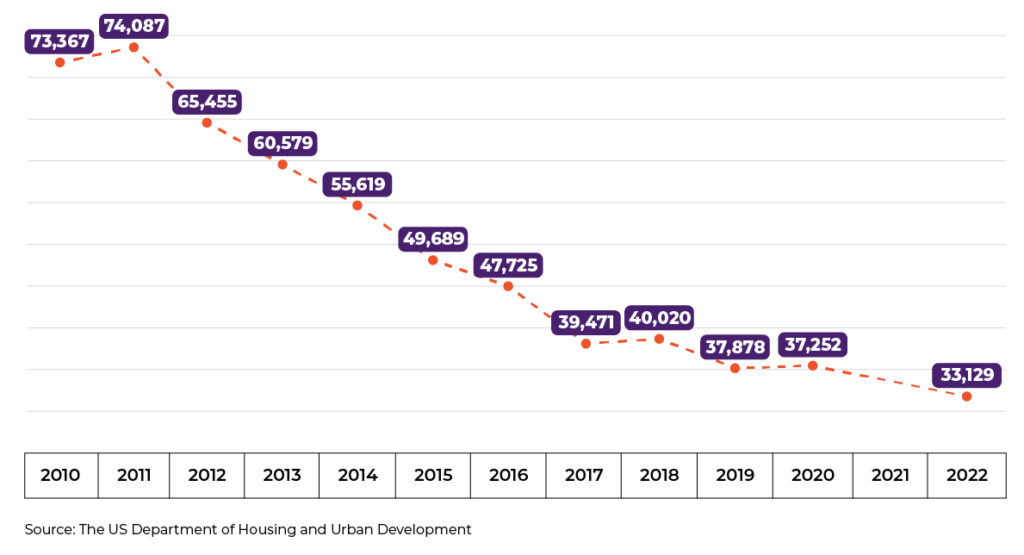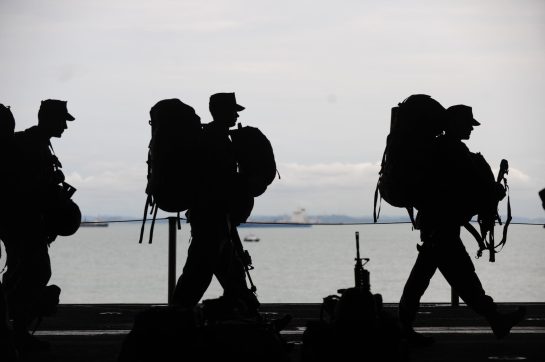Veteran’s Day is a time to honor all those who have served our country in any of the armed forces. But too often, veterans lack support and resources and tend to disproportionately experience homelessness relative to the rest of the population.
Every year on Veteran’s Day, the United States honors those who have served in the military, often putting their lives on the line for their country. It’s important during this time not only to pay homage but also to consider the state of veteran mental health, homelessness, and other factors that disproportionately impact those who have served.
Veterans have long made up an outsized portion of the homeless population. As of the latest national point-in-time (PIT) report, US veterans are more likely than the average American to experience homelessness, and it’s estimated that on any given night, 33,129 veterans were experiencing homelessness.
The upshot is that this represents a significant improvement compared to years past. PIT data from 2009 to 2022 shows a nearly 55% decrease in veteran homelessness, with an 11% drop from 2020 alone.

While this improvement is encouraging, we still must ask: Why is it that veterans experience homelessness at such high rates? Researchers struggle to find a single answer to that question. There are many factors that contribute, including:
- Poverty. Many veterans come from lower income backgrounds, and it’s estimated that nearly 500,000 veterans pay over 50% of their incomes in rent. Of that group, 55% live beneath the poverty level and 43% rely on food stamps.
- Lack of a social support net. Veterans are more likely to experience social isolation after discharge, with low rates of marriage, high rates of divorce, and up to one in five veterans living alone.
- Disability. Many veterans experience disabilities acquired in the line of service to their country. For instance, of the 1.6 million veterans who served in Iraq and Afghanistan, roughly 45% seek disability compensation, with an average wait time for claim processing estimated at eight months.
Additionally, there is a significant racialized element to the issue. Pine Street Inn, citing information from the National Coalition for Homeless Veterans, notes that while 12.3% of all veterans are Black and only 8.2% are Hispanic or Latino, nearly 56% of all homeless veterans are Black or Hispanic/Latino.
Obviously, veteran homelessness is a serious and complex problem. Government agencies like the Department of Veterans Affairs (VA) and the Department of Housing and Urban Development (HUD) work to provide improved housing, job training, and homelessness prevention, and seek to prioritize veterans in receiving homeless services; community service providers across the country work tirelessly to end veteran homelessness and help veterans live more full lives. Eccovia is proud to work with many organizations that serve veterans as part of our broader mission to help health and social services agencies better serve their communities.
Of course, most people can’t dedicate themselves full time to ending veteran homelessness. But there are still ways everyday Americans can help. In addition to volunteering part time for service providers, donating to organizations that support homeless veterans, and other forms of direct action, strategic advocacy can make a big difference.
Boston University’s Thomas Byrne, who studies the causes of veteran homelessness, argues that one important way to support veterans is advocating for increased affordable housing. In a 2022 interview with The Brink, Byrne states that the root of all homelessness, including veteran homelessness, is the lack of affordable housing. It’s no secret that the stock of available homes has remained small and the cost of housing and rent has dramatically increased in recent years, which is an issue that has affected most Americans. “Wherever it’s within your power,” urges Bryne, “advocate for the expansion of housing for folks who are experiencing homelessness or just everyone in general.”
As we celebrate our veterans, it’s crucial to remember to support those who have served their country and are now struggling. If you or anyone in your life is a veteran experiencing or at risk of homelessness, you may find help by contacting the National Call Center for Homeless Veterans, or by reaching out to Supportive Services for Veteran Families, where you can get connected to local resources and providers.



